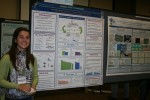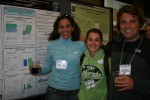I am an undergraduate student volunteering in Dr. Jennifer Rehage's lab at the Florida Coastal Everglades (FCE) LTER site and one of only two FCE undergraduates to attend the 2012 All Scientists Meeting (ASM) in Estes Park, Colorado.
Just to be clear, I go by the name Mari, never Maria or Mary. I'm 19 years old, the oldest of three sisters, and a sophomore at Florida International University (FIU) in Miami, Florida. My parents are both immigrants from Cuba and Argentina and I'm the first person in my family to go to college.
My dream is to be a vet some day, and since it's nearly impossible to get into one of the few vet schools in the United States I decided to join a fairly new program called QBIC, or quantifying biology in the classroom, at FIU. It is a very rigorous biology centered program, and I believe we work harder than anyone else; in fact we are constantly reminded that more is expected from us. It really is a lot of work and requires a lot of dedication, but I love it. This program steers us towards research and in my first semester as a freshman I was already talking to Dr. Rehage for a position in her lab as a volunteer.
I started in Dr. Rehage’s lab in January 2012 and expressed interest in one of the side projects of one of our FCE graduate students. I applied for two grants was lucky to get a National Science Foundation-funded Research Experience for Undergraduates (REU) grant through FCE.
The title of my project is “Healthy snack or junk food? Examining the nutritional quality of freshwater and estuarine prey in the southwest Everglades Estuary.” Basically, marsh fishes subsidize estuarine consumers such as snook. My project seeks to understand why snook, being an estuarine consumer chose to eat these marsh prey species over equally abundant estuarine prey. So we asked "What is the quality of the marsh subsidy?"
This past summer, a high school junior whom I was mentoring, Steven Santos, and I spent most of our time in a chemistry laboratory blowing up fish to determine their caloric, as well as nitrogen, phosphorus, and carbon content. We got some pretty cool results. It turns out that freshwater prey fishes are significantly higher in calories than estuarine prey fishes, although there was no significant nutrient difference between them.
I've now fallen in love with research. But don’t get me wrong: I still want to become a vet with a PhD—that is, a doctor of veterinary medicine (DVM/PhD)– except now Dr. Rehage says she isn't gonna let me go to vet school!
This was my very first conference and my first ever visit to Colorado and it definitely cemented my love for research. I went with members of my lab, but I brought my mom along so we could have a mother-daughter vacation. I'd attend the plenaries and the working group sessions and then go hike in the mountains. It was really cool to see what everyone else is doing for our earth. I had to slow myself down because I wanted to do everything that everyone else was doing. It's a really cool feeling to know people still care about the world and that so many brilliant scientists are working together to help restore and maintain it.
As you can imagine, my poster at ASM had some pretty neat diagrams and drawings to share our exciting findings. I could gladly have stood in front of my poster for the rest of my life. It was a pretty cool high to know that as a 19-year-old I had done something important that other scientists acknowledged, and that I was helping my home environment. This REU grant showed me that I can give back to my community and that I can help keep my backyard safe.
I was just so grateful after this trip. I always thought science was full of mean people who wanted the credit all to themselves. I was so wrong. There are so many people out there who want to help and want to see you succeed and be the best that you can become, it's just beautiful. I can now say without a doubt that science, ecology, is awesome! Now it is on to getting some publications ready.
I realize that I couldn't have done all this without the help, motivation, and support of my mentor, Ross Boucek, Dr. Rehage, the members of The Rehage Lab, my family, and all my teachers and friends in the QBIC program.
By Mariajesus Soula, REU student (FCE)

 Enlarge this image
Enlarge this image
